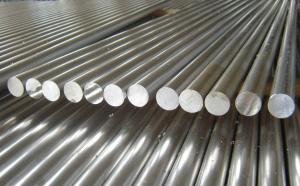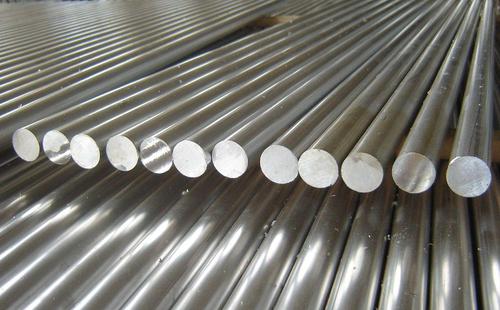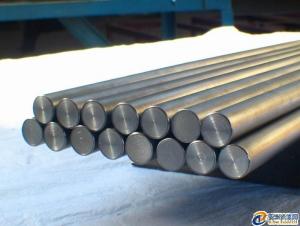Round Bar 5mm-10mm Hot Rolled High Quality Q195 Q235
- Loading Port:
- China Main Port
- Payment Terms:
- TT or LC
- Min Order Qty:
- -
- Supply Capability:
- -
OKorder Service Pledge
OKorder Financial Service
You Might Also Like
Product Description:
OKorder is offering high quality Hot Rolled Steel I-Beams at great prices with worldwide shipping. Our supplier is a world-class manufacturer of steel, with our products utilized the world over. OKorder annually supplies products to European, North American and Asian markets. We provide quotations within 24 hours of receiving an inquiry and guarantee competitive prices.
Product Applications:
Deformed bar is widely used in buildings, bridges, roads and other engineering construction. Big to highways, railways, bridges, culverts, tunnels, public facilities such as flood control, dam, small to housing construction, beam, column, wall and the foundation of the plate, deformed bar is an integral structure material. With the development of world economy and the vigorous development of infrastructure construction, real estate, the demand for deformed bar will be larger and larger
Product Advantages:
OKorder's Steel I-Beams are durable, strong, and resist corrosion, exact size, regular package, chemical and mechanical properties are stable.
Main Product Features:
· Premium quality
· Prompt delivery & seaworthy packing (30 days after receiving deposit)
· Corrosion resistance
· Can be recycled and reused
· Mill test certification
· Professional Service
· Competitive pricing
Product Specifications:
Manufacture: Hot rolled
Grade: BS4449
Certificates: ISO, SGS, BV, CIQ
Diameter: 6mm,8mm,10mm,12mm,14mm,16mm,18mm,20mm,
22mm,25mm,28mm,32mm,36mm,40mm,50mm
Length: 6M, 9M,12M or as required
Packaging: Export packing, nude packing, bundled
Chemical Composition: (Please kindly find our chemistry of our material based on HRB500 as below for your information)
Grade | Technical data of the original chemical composition (%) | ||||||
C | Mn | Si | S | P | V | ||
HRB400 | ≤0.25 | ≤1.60 | ≤0.80 | ≤0.045 | ≤0.045 | 0.04-0.12 | |
Physical capability | |||||||
Yield Strength (N/cm²) | Tensile Strength (N/cm²) | Elongation (%) | |||||
≥400 | ≥570 | ≥14 | |||||
Theoretical weight and section area of each diameter as below for your information:
Diameter(mm) | Section area (mm²) | Mass(kg/m) | Weight of 12m bar(kg) |
6 | 28.27 | 0.222 | 2.664 |
8 | 50.27 | 0.395 | 4.74 |
10 | 78.54 | 0.617 | 7.404 |
12 | 113.1 | 0.888 | 10.656 |
14 | 153.9 | 1.21 | 14.52 |
16 | 201.1 | 1.58 | 18.96 |
18 | 254.5 | 2.00 | 24 |
20 | 314.2 | 2.47 | 29.64 |
22 | 380.1 | 2.98 | 35.76 |
25 | 490.9 | 3.85 | 46.2 |
28 | 615.8 | 4.83 | 57.96 |
32 | 804.2 | 6.31 | 75.72 |
36 | 1018 | 7.99 | 98.88 |
40 | 1257 | 9.87 | 118.44 |
50 | 1964 | 15.42 | 185.04 |
FAQ:
Q1: Why buy Materials & Equipment from OKorder.com?
A1: All products offered byOKorder.com are carefully selected from China's most reliable manufacturing enterprises. Through its ISO certifications, OKorder.com adheres to the highest standards and a commitment to supply chain safety and customer satisfaction.
Q2: What makes stainless steel stainless?
A2: Stainless steel must contain at least 10.5 % chromium. It is this element that reacts with the oxygen in the air to form a complex chrome-oxide surface layer that is invisible but strong enough to prevent further oxygen from "staining" (rusting) the surface. Higher levels of chromium and the addition of other alloying elements such as nickel and molybdenum enhance this surface layer and improve the corrosion resistance of the stainless material.
Q3: Can stainless steel rust?
A3: Stainless does not "rust" as you think of regular steel rusting with a red oxide on the surface that flakes off. If you see red rust it is probably due to some iron particles that have contaminated the surface of the stainless steel and it is these iron particles that are rusting. Look at the source of the rusting and see if you can remove it from the surface.
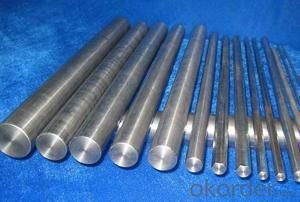
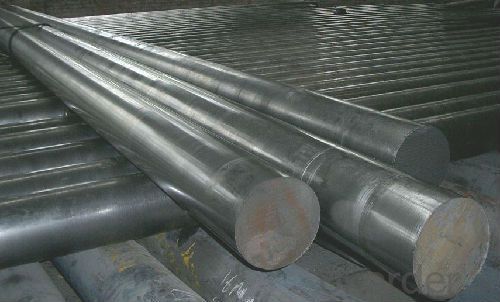
- Q: What is the impact strength of a steel round bar?
- The impact strength of a steel round bar refers to its ability to withstand sudden applied forces or shock loads without fracturing or breaking. It is usually measured in terms of energy absorbed during impact testing, such as the Charpy or Izod test. The exact impact strength can vary depending on the specific grade and heat treatment of the steel, but steel round bars are generally known for their high impact strength, making them suitable for applications requiring resistance to sudden impacts or dynamic loads.
- Q: What is the modulus of elasticity of a steel round bar?
- Young's modulus, also known as the modulus of elasticity, is a crucial measure when assessing the stiffness and ability of a steel round bar to resist deformation under an external force. Generally, the modulus of elasticity for steel is around 200 GPa. Consequently, when a unit of stress is applied to the steel round bar, it will undergo an elastic deformation ranging from approximately 0.0035 to 0.005, depending on the specific grade and composition of the steel. Hence, the modulus of elasticity plays a significant role in structural and mechanical engineering applications, as it dictates the level of deflection or deformation to be expected under various loading conditions.
- Q: Can steel round bars be used for making sculptures?
- Yes, steel round bars can be used for making sculptures. Steel is a versatile and durable material that can be easily shaped and manipulated into various forms, making it suitable for sculpting. The round bars can be welded, bent, or cut to create the desired shapes and structures for the sculpture. Additionally, steel's strength and resistance to corrosion make it a long-lasting choice for outdoor sculptures.
- Q: How do you check the quality of a steel round bar?
- To check the quality of a steel round bar, several factors need to be considered. Firstly, it is important to assess the bar's dimensions. This involves measuring its diameter, length, and straightness. Any deviation from the specified dimensions could indicate a lower quality bar. Next, the surface condition of the steel round bar should be inspected. It should be free from any visible defects, such as cracks, pits, or surface irregularities. Additionally, the bar's surface should be smooth and devoid of any significant roughness or burrs. Furthermore, the chemical composition of the steel round bar must be examined. This can be determined through spectroscopic analysis or other testing methods. The composition should meet the required standards and specifications, as any deviations can affect the bar's strength and durability. Another crucial aspect to consider is the mechanical properties of the steel round bar. This involves testing its tensile strength, yield strength, and elongation. These tests can be conducted using specialized machines to ensure that the bar meets the necessary strength requirements. Additionally, the steel round bar can be subjected to non-destructive testing methods, such as ultrasonic testing or magnetic particle inspection. These techniques help identify any internal or surface defects that may impact the bar's quality. Furthermore, it is essential to verify the bar's compliance with industry standards and certifications. This includes checking if the steel round bar meets the specifications set by organizations such as ASTM International or ISO. Lastly, it is advisable to consult with reputable suppliers or manufacturers who have a proven track record in producing high-quality steel round bars. They can provide documentation, certifications, and test reports to validate the quality of their products. In summary, evaluating the dimensions, surface condition, chemical composition, mechanical properties, compliance with standards, and supplier's reputation are key steps to check the quality of a steel round bar. By thoroughly examining these factors, one can ensure the reliability and performance of the steel round bar for their intended applications.
- Q: What are the different shapes available in steel round bars?
- There are several different shapes available in steel round bars, including round, square, hexagonal, and octagonal.
- Q: What is the yield strength of a steel round bar?
- The yield strength of a steel round bar refers to the amount of stress or force that the bar can withstand before it starts to deform or permanently change shape. This is an important property to consider when designing or selecting materials for structural applications. The yield strength of a steel round bar can vary depending on the specific grade or type of steel being used. Common grades of steel such as A36, 1018, and 4140 typically have yield strengths ranging from 36,000 psi (pounds per square inch) to 100,000 psi. However, it is important to note that the yield strength can also be influenced by factors such as heat treatment, manufacturing processes, and the presence of any alloying elements in the steel composition. Therefore, it is always recommended to consult the specific material specifications or conduct proper testing to determine the exact yield strength of a steel round bar in a given application.
- Q: What are the advantages of using niobium-alloy steel round bars?
- There are several advantages to using niobium-alloy steel round bars. Firstly, niobium-alloy steel has excellent strength and toughness properties. The addition of niobium to the steel increases its strength while maintaining its ductility, making it ideal for applications that require high strength and durability. This allows niobium-alloy steel round bars to withstand heavy loads and shocks without deforming or breaking easily. Secondly, niobium-alloy steel has a high resistance to corrosion. This makes it suitable for use in harsh environments where exposure to moisture, chemicals, or corrosive substances is common. The corrosion resistance of niobium-alloy steel ensures that the round bars will remain intact and retain their structural integrity over time, reducing the need for frequent replacements and maintenance. Additionally, niobium-alloy steel has excellent weldability and formability. It can be easily welded and fabricated into various shapes and sizes, making it adaptable to different manufacturing processes and applications. This versatility allows for the production of custom-designed round bars that meet specific project requirements. Moreover, niobium-alloy steel has good heat resistance properties. It can withstand high temperatures without losing its strength or undergoing significant changes in its mechanical properties. This makes it suitable for applications that involve exposure to extreme heat or thermal cycling, such as in the aerospace or automotive industries. Furthermore, niobium-alloy steel is known for its excellent fatigue resistance. It has a high endurance limit, which means it can withstand repeated loading and unloading cycles without experiencing fatigue failure. This makes niobium-alloy steel round bars ideal for applications that involve dynamic or cyclic loading, such as in structural components or machinery. In conclusion, the advantages of using niobium-alloy steel round bars include high strength, corrosion resistance, weldability, formability, heat resistance, and fatigue resistance. These properties make niobium-alloy steel a reliable and cost-effective choice for various industries and applications.
- Q: How do steel round bars compare to rubber round bars?
- Steel round bars and rubber round bars have different properties and applications. Steel round bars are known for their strength, durability, and resistance to high temperatures and corrosion. They are commonly used in construction, manufacturing, and engineering projects that require structural support or reinforcement. On the other hand, rubber round bars are known for their flexibility, shock absorption, and noise reduction properties. They are often used in applications such as automotive parts, conveyor belts, and vibration isolation systems. Overall, the choice between steel and rubber round bars depends on the specific requirements of the application and the desired properties needed.
- Q: What is the corrosion resistance of steel round bars?
- The corrosion resistance of steel round bars depends on the type of steel and the environmental conditions they are exposed to. Generally, stainless steel round bars offer excellent corrosion resistance due to the presence of chromium, which forms a protective oxide layer on the surface of the steel. This oxide layer acts as a barrier, preventing further corrosion from occurring. However, carbon steel round bars are more susceptible to corrosion, especially in environments with high moisture or exposure to corrosive substances. In these cases, additional protective measures such as coatings or galvanizing may be required to enhance their corrosion resistance. It's important to note that the performance of steel round bars in corrosive environments also depends on various factors like temperature, pH level, and the presence of other elements or chemicals. Therefore, it is recommended to consider the specific application and consult with corrosion experts to determine the most suitable steel grade and corrosion protection measures for your needs.
- Q: What are the corrosion resistance properties of steel round bars?
- Due to the presence of alloying elements like chromium, nickel, and molybdenum, steel round bars possess exceptional corrosion resistance. These elements combine to form a protective oxide layer on the steel's surface, effectively preventing contact with corrosive substances. By reacting with oxygen in the air, chromium in steel round bars forms a thin, unnoticeable layer of chromium oxide. This layer plays the role of a barrier, shielding the steel from further oxidation and corrosion. Additionally, nickel and molybdenum enhance the corrosion resistance of steel by increasing its ability to withstand pitting, crevice corrosion, and chloride-induced stress corrosion cracking. Apart from alloying elements, the manufacturing process can also impact the corrosion resistance of steel round bars. For example, stainless steel round bars are frequently subjected to passivation, a process that eliminates free iron and other contaminants from the surface. Passivation contributes to the steel's corrosion resistance by creating a clean and inert surface that is less susceptible to corrosion. In conclusion, steel round bars are renowned for their remarkable corrosion resistance, which makes them well-suited for a wide array of applications across various industries, including construction, marine, automotive, and aerospace.
Send your message to us
Round Bar 5mm-10mm Hot Rolled High Quality Q195 Q235
- Loading Port:
- China Main Port
- Payment Terms:
- TT or LC
- Min Order Qty:
- -
- Supply Capability:
- -
OKorder Service Pledge
OKorder Financial Service
Similar products
Hot products
Hot Searches
Related keywords
